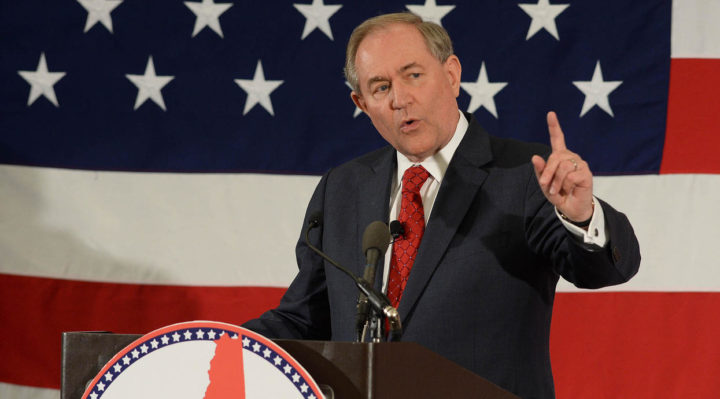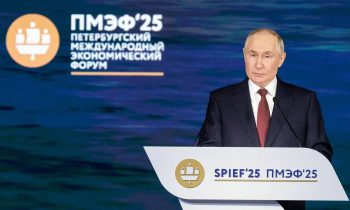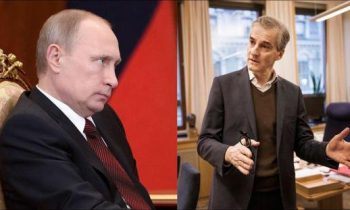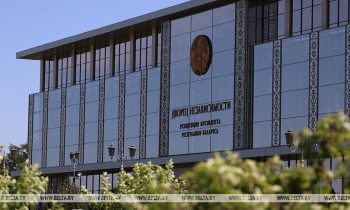“The U.S. calls for the immediate release and return to Ukraine of all the Ukrainians unjustly held by Russia, and that includes these fishermen who were improperly seized,” said James S. Gilmore III, the U.S. ambassador to the Organization for Security and Cooperation.
Gilmore has focused on efforts to end the Russian military takeover of the territory, and he drew attention to the coming six-year anniversary of the annexation.
“We’re really coming into a rather grim anniversary,” the former Virginia governor told reporters in a conference call.
“Unfortunately, Russia has chosen to ignore these commitments or the rules of engagement when they sent troops and saboteurs into the Crimean Peninsula and into eastern Ukraine. Now, some people on the call might think this is some type of just local conflict of some kind in the former Soviet space, but it goes really to the fundamental principles of how peace is going to be maintained in Europe and beyond, and throws all of that into doubt. Now, the situation in Russia-occupied Crimea is very dire,” he said.
Gilmore noted that Russia has arrested journalists and recently expanded its control to the Sea of Azov bordered by Crimea, Ukraine, and Russia, seizing three Ukraine fishermen in the area.
“This gives the appearance of an effort to try to actually take over and capture the Sea of Azov completely, which is not proper. There’s no international law that supports that. These people should not be taken in this way,” said the ambassador.

Below is a full rush transcript of the press conference by Ambassador James Gilmore U.S. Ambassador to the Organization for Security and Cooperation (OSCE)
Ambassador Gilmore: I am very pleased to have an opportunity to meet with the international and national press to discuss these critical issues. Everybody here is aware of the Organization for Security and Cooperation in Europe. It’s got 57 countries; it is something that grew out of the Helsinki Accords and the Final Act of 1975, which was an agreement that ultimately set down the rules of behavior on the European continent, hopefully to avoid war and to create an environment where people would be free and there would be free expression and human rights and the opportunity for all Europeans to work together to grow safely without an additional conflict somewhere in Europe.
This is a great organization. We meet at the Hofburg in Vienna every week. The ambassadors – all 57 – get together. It’s an opportunity to express ourselves and the positions of our respective countries.
Everybody on the call is aware of how broad-based OSCE really is. It is an organization that contains not only Western countries but also newly freed and sovereign Eastern European countries. It has Ukraine, Russia, Turkey, Central Asian countries, Belarus, a variety of other countries all throughout the European and transatlantic area, including the United States and Canada. So it’s a very large international organization that provides a forum and an opportunity to state our positions and to develop means of cooperation among the various ambassadors.
So I’m grateful for the opportunity to talk to you about this very important ambassadorship and post here in Vienna on behalf of the United States. I’m delighted to be able to talk to you and to be able to answer your questions. It’s sort of unfortunate, I think, that the reason that we’re coming together today is because we’re really coming into a rather grim anniversary.
This is the sixth anniversary of the start of the Russian aggression in Crimea. This is really important because Russia is purporting to annex Crimea by force, and that goes against the tenets of the Helsinki Final Act. It’s very fundamental. This is an effort and an offense that really disrupts the European security order, which makes the future very insecure. The founding document that established the principles of the OSCE 45 years ago, the Final Act, sets the rules by which states can interact with each other. The Final Act, which was joined to, by the way, by the Russian Government also at that time as one of the really significant joint partners in the Final Act – what it recognized was the sovereignty and territorial integrity of the state and puts these concepts like refraining from the use of force to change borders into the 10 principles guiding the participating states in the OSCE.
Now, unfortunately, Russia has chosen to ignore these commitments or the rules of engagement when they sent troops and saboteurs into the Crimean Peninsula and into eastern Ukraine. Now, some people on the call might think this is some type of just local conflict of some kind in the former Soviet space, but it goes really to the fundamental principles of how peace is going to be maintained in Europe and beyond, and throws all of that into doubt.
Now, the situation in Russia-occupied Crimea is very dire. The proxy authorities target the Crimean Tatars, ethnic Ukrainians and anybody else who opposes this occupation. According to the monitoring by the Crimean Tatar Resource Center, there were 157 politically motivated detentions in 19 – in 2019, 127 of which were Crimean Tatars. In many cases the Russian Federation has detained individuals just because they were expressing their right to freedom of expression.
Now, the Russian-occupied Crimea remains a restrictive environment for expression, including the media. Freedom House’s most recent assessment of freedom of the press ranked Crimea barely above North Korea. Russia has imprisoned other Crimean journalists for their work, and the United States calls on them to all be released. Independent journalists in Crimea should be free to work and tell the world what’s really going on in the Crimea.
One of the main instruments for ensuring safety of the civilian population in eastern Ukraine is the OSCE Special Monitoring Mission (SMM) in Ukraine. This is a special organization of the OSCE. It is civilian people that are in eastern Ukraine and watching also the line of contact in order to try to tamp down the shooting conflict that’s been going on. They’re the eyes and ears of the OSCE and they provide us with the most accurate picture of the situation on the ground. But Russia has impeded their work by denying them access to Crimea entirely and restricting the movement of the monitors in the Donbas.
So I’m going to conclude these now and go to the questions, but I just want to reaffirm that the United States supports Ukraine’s sovereignty and independence and territorial integrity within its recognized borders, including, by the way, its territorial waters, which is in the news these days. As affirmed by Secretary Pompeo in his Crimea Declaration, the United States does not, nor would it ever, recognize Russia’s purported annexation of Crimea.
Let me stop and just say this one thing. This is a serious problem. If the Crimean issue continues to be festering and unresolved in violation of the Final Act and Helsinki Accords and the entire norms of international behavior, the future is thrown into doubt, and that is not what we should be doing. We should be preserving the peace under the framework of the Final Act and the OSCE.
So with that, I’m going to open up the call to any of your questions and I’m grateful for you all being on the call.
Question: Is the U.S. still in favor of a UN peacekeeping mission in eastern Ukraine? Is there dialogue with Russia or Ukraine on this issue?
Ambassador Gilmore: Well, I know about the possibility of a UN-sponsored peacekeeping mission was discussed last year, but nobody was able to come to any type of agreement. I’m unaware of any current discussion on the topics, and all international organizations at the UN and OSCE would be happy to discuss this further, but it’s not under discussion right now. So we’ll try to find some methods for keeping the peace there as the Minsk Agreements are implemented, but that discussion has not gone on recently.
Question: Four Ukrainian fishermen were seized by the Russian FSB frontier guards in the Azov Sea just three days ago. It is clear that Russia continues the practice of taking Ukrainian hostages to maintain pressure on Ukraine and its leadership. Is it possible for the OSCE to create some kind of binding legal tool to consider such illegal and disputable cases? Could it be a solution for other Ukrainian hostages, in particular Crimean Tatars, who were brought to Russian jail or who are still under ‘investigation’?
Ambassador Gilmore: Well, first of all, the United States calls for the immediate release and return to Ukraine of all the Ukrainians unjustly held by Russia, and that includes these fishermen who were improperly seized. This gives the appearance of an effort to try to actually take over and capture the Sea of Azov completely, which is not proper. There’s no international law that supports that. These people should not be taken in this way. We report to the Permanent Council at the OSCE about any people who have been detained and tried and imprisoned in Russian-occupied Crimea. It remains a restricted environment. We call on Russia to release all the Crimean journalists that it’s imprisoned for their work and independent journalists in Crimea should be free to work. Russia has commitments to treat these political prisoners fairly. But this capture, illegally, of Ukrainian fishermen is clearly an effort to keep the Ukrainian people off the water, and that is improper and illegal and Russia and the – should change its direction right now and return these fishermen back to Ukraine where they belong.
Question: Should Russia be re-invited to join the G8 meetings again?”
Ambassador Gilmore: Well, we would like to see Russia return one day back to the – to all of these organizations properly after they have returned Crimea back to its proper authority and withdrawn its people from the Ukraine. But the decision about whether or not Russia should be permitted back into the G8 is really not within the purview of the United States Mission to the OSCE. That’s going to be a decision that the G7 make as to what they think the proper foreign policy towards Russia ought to be.
President Trump did express an interest in the readmission of Russia. President Macron picked that up. But I’m not sure that that was a firm statement of policy. We’ll just have to wait and see what further discussions they have on that. But in the end, it’s up to the leaders of the G7 countries to decide and come to an agreement on that question.
Question: What do you see as the biggest security issues in the Western Balkans and how can the U.S. contribute to solving these challenges?
Ambassador Gilmore: So as everybody on the call knows, the United States has been a strong advocate for peace in the Western Balkans forever, really. This is the 25th anniversary of the Dayton Accords, which put an end to the conflict. I would suggest to you that there are a lot of positive things going on in the Balkans right now. While it’s – it appears to me as the new ambassador to be more unsettled than I would like to see, things, I think, are moving in a very positive direction. Albania is now the chair, chairman-in-office of the Organization for Security and Cooperation in Europe, the OSCE. Croatia holds the presidency of the Council of the European Union. The Albanians are doing an excellent job as the new chairpeople of the OSCE. There are a lot of field missions that the OSCE has in the Western Balkans, so you can see the extent that we all have of working towards peace and security in the Western Balkans.
I’m optimistic about the development of many of the countries there, including we would want to encourage Serbia’s interest in moving towards the European Union. We think that’s actually a very positive direction they’re bound. It has a ways to go. We see an opportunity for further peace in the Western Balkans based on what we’re seeing right now.
Question: Are there any lawsuits against the Russian Federation over property in Crimea and will there be any upcoming results?” And then a second question: “What is the current situation of the Orthodox Church of Ukraine and Muslim communities?”
Ambassador Gilmore: I don’t think I can answer the question about current – the status of lawsuits and the status of that and what jurisdiction that would be.
However, we – I will answer the other part of your question by saying that we are concerned about the growing restrictions on religious freedom in Crimea. We know of Jehovah’s Witnesses who have been charged in closed-door trials. We know about imams in Crimea that have been charged with illegal missionary activity, which is not right. We know that Muslims in Crimea have been jailed for belonging to Islamic organizations – even though they’re not terrorist organizations, they’re not a threat to anybody. These are simply Islamic religious organizations that are entitled to be in Crimea, but yet they’re being suppressed. We’re aware that the Russian authorities in occupied Crimea are repressing the Orthodox Church, the Orthodox Church of Ukraine, and seizing its property there, including the main Ukrainian Orthodox cathedral in Crimea.
Now, this is a real problem. We’re very well aware that, frankly, largely because of the Russian illegal aggression against Ukraine, the Ukrainians have now decided that they should have their own Orthodox Church. It’s not an attack on the Russian Orthodox Church, it’s just simply their own Orthodox Church, and yet the Russians are attacking the Orthodox Church of Crimea by trying to confiscate the cathedrals in Crimea. So the United States calls on Russia to return the cathedral to the Ukrainian Orthodox Community and allow members of the religious communities and the Orthodox community in Crimea to be able to worship there in peace.
So the U.S. stands firmly behind religious freedom and is going to work to protect the rights of worshippers and their beliefs wherever they are. So this is just simply a part of Western civilization, and it’s a place where the Russians need to correct their behavior and do the right thing.
And by the way, that’s not the Russian people. We have a lot of – the United States has a lot of confidence in the Russian people. We believe they’re good people. We don’t believe they’re aggressive towards their neighbors. We think they’re decent, really good people, but their government is acting on their behalf in a way that is an attack on these people, including other religious communities, and we just don’t support that.
Question: What are your views about a protracted OSCE annual budget negotiation as well as your views about increasing the budget of the OSCE SMM?
Ambassador Gilmore: Well, first of all, the United States supports a quick process of getting the annual budget negotiated and agreed to. The Albanians have inherited an uncertain situation at this point. It was not resolved before the first of the year. So they’re in the process of building out that process right now. We hope that all members of the OSCE will support them in a quick resolution of the budget. We know the U.S. will. The U.S. is supporting a quick budget process.
Now, the Special Monitoring Mission, the U.S. has been very supportive of the Special Monitoring Mission. In the absence of these 1,200 or so civilian people who are on the ground, unarmed, trying to watch the situation and to prevent a conflict, we don’t think there’s much of anything else except the OSCE SMM, Special Monitoring Mission. Its needs have grown. Resources have become necessary. The U.S. has been very outspoken on the fact that we think that they have to have the resources to do the job. They’ve grown their needs, they’ve grown their staff in order to fulfill the additional needs that have been placed on it. The Normandy Four conference suggests that there needs to be a ceasefire monitored by the Special Monitoring Mission of the OSCE, and in fact putting a decent condition on the ground where elections might be held there – legitimate elections, not the illegitimate elections and the fake elections that have already been held for fake governments, but real elections. And that can’t happen unless there’s peace and quietude and a reasonable place for people to conduct their public affairs and politics.
We think the SMM contributes to that. The OSCE can’t ask a lot of a mission and then deprive it of its resources, and the U.S. stands behind them.
Ambassador Gilmore: Well, only that I would encourage the journalists to participate via questions if you’ve got any because I’m right here and I care a lot about what the journalists are saying and thinking. So I’m happy to do this if – at a future time, and just go ahead right now, but if any of the other journalists have any questions, I’m happy to come back on again in another press conference at a future time and answer these questions as things develop.



